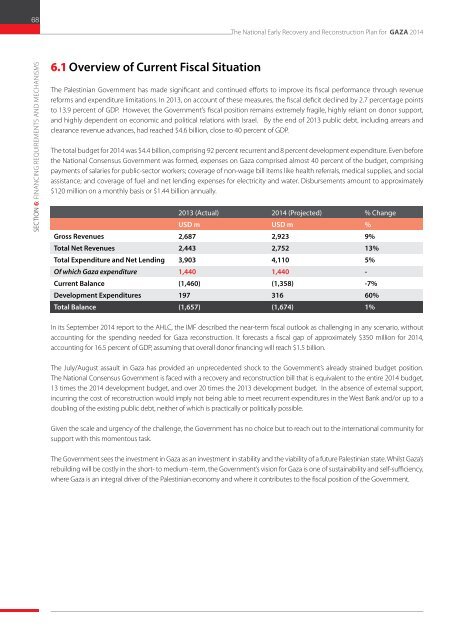National Early Recovery and Reconstruction Plan for Gaza 2014-2017_FINAL...
National Early Recovery and Reconstruction Plan for Gaza 2014-2017_FINAL...
National Early Recovery and Reconstruction Plan for Gaza 2014-2017_FINAL...
Create successful ePaper yourself
Turn your PDF publications into a flip-book with our unique Google optimized e-Paper software.
68<br />
The <strong>National</strong> <strong>Early</strong> <strong>Recovery</strong> <strong>and</strong> <strong>Reconstruction</strong> <strong>Plan</strong> <strong>for</strong> <strong>Gaza</strong> <strong>2014</strong><br />
SECTION 6: FINANCING REQUIREMENTS AND MECHANISMS<br />
6.1 Overview of Current Fiscal Situation<br />
The Palestinian Government has made significant <strong>and</strong> continued ef<strong>for</strong>ts to improve its fiscal per<strong>for</strong>mance through revenue<br />
re<strong>for</strong>ms <strong>and</strong> expenditure limitations. In 2013, on account of these measures, the fiscal deficit declined by 2.7 percentage points<br />
to 13.9 percent of GDP. However, the Government’s fiscal position remains extremely fragile, highly reliant on donor support,<br />
<strong>and</strong> highly dependent on economic <strong>and</strong> political relations with Israel. By the end of 2013 public debt, including arrears <strong>and</strong><br />
clearance revenue advances, had reached $4.6 billion, close to 40 percent of GDP.<br />
The total budget <strong>for</strong> <strong>2014</strong> was $4.4 billion, comprising 92 percent recurrent <strong>and</strong> 8 percent development expenditure. Even be<strong>for</strong>e<br />
the <strong>National</strong> Consensus Government was <strong>for</strong>med, expenses on <strong>Gaza</strong> comprised almost 40 percent of the budget, comprising<br />
payments of salaries <strong>for</strong> public-sector workers; coverage of non-wage bill items like health referrals, medical supplies, <strong>and</strong> social<br />
assistance; <strong>and</strong> coverage of fuel <strong>and</strong> net lending expenses <strong>for</strong> electricity <strong>and</strong> water. Disbursements amount to approximately<br />
$120 million on a monthly basis or $1.44 billion annually.<br />
2013 (Actual) <strong>2014</strong> (Projected) % Change<br />
USD m USD m %<br />
Gross Revenues 2,687 2,923 9%<br />
Total Net Revenues 2,443 2,752 13%<br />
Total Expenditure <strong>and</strong> Net Lending 3,903 4,110 5%<br />
Of which <strong>Gaza</strong> expenditure 1,440 1,440 -<br />
Current Balance (1,460) (1,358) -7%<br />
Development Expenditures 197 316 60%<br />
Total Balance (1,657) (1,674) 1%<br />
In its September <strong>2014</strong> report to the AHLC, the IMF described the near-term fiscal outlook as challenging in any scenario, without<br />
accounting <strong>for</strong> the spending needed <strong>for</strong> <strong>Gaza</strong> reconstruction. It <strong>for</strong>ecasts a fiscal gap of approximately $350 million <strong>for</strong> <strong>2014</strong>,<br />
accounting <strong>for</strong> 16.5 percent of GDP, assuming that overall donor financing will reach $1.5 billion.<br />
The July/August assault in <strong>Gaza</strong> has provided an unprecedented shock to the Government’s already strained budget position.<br />
The <strong>National</strong> Consensus Government is faced with a recovery <strong>and</strong> reconstruction bill that is equivalent to the entire <strong>2014</strong> budget,<br />
13 times the <strong>2014</strong> development budget, <strong>and</strong> over 20 times the 2013 development budget. In the absence of external support,<br />
incurring the cost of reconstruction would imply not being able to meet recurrent expenditures in the West Bank <strong>and</strong>/or up to a<br />
doubling of the existing public debt, neither of which is practically or politically possible.<br />
Given the scale <strong>and</strong> urgency of the challenge, the Government has no choice but to reach out to the international community <strong>for</strong><br />
support with this momentous task.<br />
The Government sees the investment in <strong>Gaza</strong> as an investment in stability <strong>and</strong> the viability of a future Palestinian state. Whilst <strong>Gaza</strong>’s<br />
rebuilding will be costly in the short- to medium -term, the Government’s vision <strong>for</strong> <strong>Gaza</strong> is one of sustainability <strong>and</strong> self-sufficiency,<br />
where <strong>Gaza</strong> is an integral driver of the Palestinian economy <strong>and</strong> where it contributes to the fiscal position of the Government.


